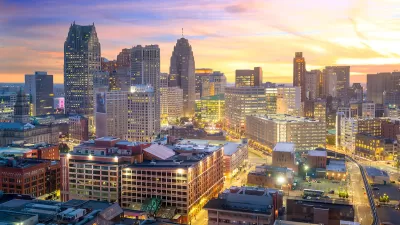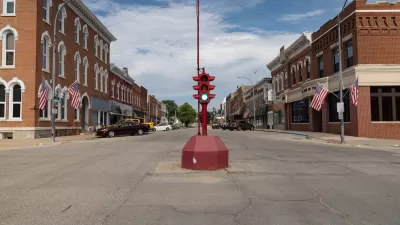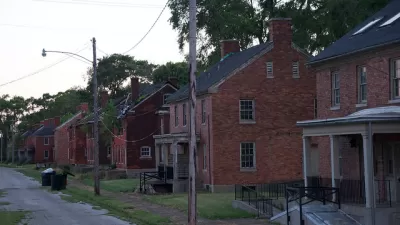As developers plan city-saving projects like a billion-dollar bridge to Canada, Detroit residents demand that tangible benefits go to their communities. City council may pass an ordinance to that effect.

Detroit has recently become the focus of a number of high-dollar redevelopment projects, and hype abounds about the city's open future. For residents still living in what remains of "old Detroit," these projects can be a mixed blessing. Alexis Stephens reports on the movement for community benefits agreements (CBAs). "For new projects with an investment of at least $15 million, expansions or renovations of at least $3 million, or projects seeking at least $300,000 in public tax subsidies, developers would have to create legally binding documents guaranteeing jobs or quality-of-life protections for the community [...]"
Stephens interviews Rashida Tlaib, a past Michigan State Representative and current community partnerships and development director for the Sugar Law Center for Economic and Social Justice. According to Tlaib, "Many of the community residents had recognized that saying no to the projects wasn't working anymore and trying to get a seat at the table would be a better option."
Tlaib argues that previous attempts to include community voices foundered as electoral sponsors rotated out of office. A mandatory CBA requirement might begin to address the problem. "We are embedding it into a Detroit ordinance, [because] I think it was just critical. I think Council President Jones hit it on the head when she said, 'Look, when I’m gone, I want something in place so we’re not always relying on trying to reeducate people that are coming into office.'"
FULL STORY: Detroit Is Taking the Lead in the Community Benefits Movement

Study: Maui’s Plan to Convert Vacation Rentals to Long-Term Housing Could Cause Nearly $1 Billion Economic Loss
The plan would reduce visitor accommodation by 25,% resulting in 1,900 jobs lost.

North Texas Transit Leaders Tout Benefits of TOD for Growing Region
At a summit focused on transit-oriented development, policymakers discussed how North Texas’ expanded light rail system can serve as a tool for economic growth.

Why Should We Subsidize Public Transportation?
Many public transit agencies face financial stress due to rising costs, declining fare revenue, and declining subsidies. Transit advocates must provide a strong business case for increasing public transit funding.

How Community Science Connects People, Parks, and Biodiversity
Community science engages people of all backgrounds in documenting local biodiversity, strengthening connections to nature, and contributing to global efforts like the City Nature Challenge to build a more inclusive and resilient future.

Alabama: Trump Terminates Settlements for Black Communities Harmed By Raw Sewage
Trump deemed the landmark civil rights agreement “illegal DEI and environmental justice policy.”

Dear Tesla Driver: “It’s not You, It’s Him.”
Amidst a booming bumper sticker industry, one writer offers solace to those asking, “Does this car make me look fascist?”
Urban Design for Planners 1: Software Tools
This six-course series explores essential urban design concepts using open source software and equips planners with the tools they need to participate fully in the urban design process.
Planning for Universal Design
Learn the tools for implementing Universal Design in planning regulations.
City of Santa Clarita
Ascent Environmental
Institute for Housing and Urban Development Studies (IHS)
City of Grandview
Harvard GSD Executive Education
Toledo-Lucas County Plan Commissions
Salt Lake City
NYU Wagner Graduate School of Public Service





























